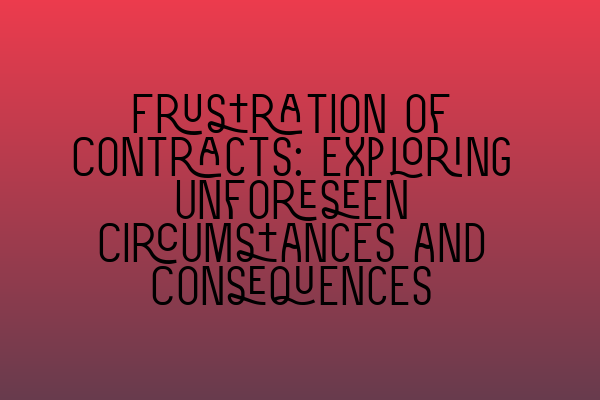Frustration of Contracts: Exploring Unforeseen Circumstances and Consequences
Introduction
Contracts are essential legal documents that govern the relationships and obligations between parties. They provide a sense of security and certainty, giving confidence to parties involved in various business transactions. However, there are instances where unforeseen circumstances arise, making it impossible for parties to fulfill their contractual obligations. In such cases, frustration of contracts comes into play. In this article, we will explore the concept of frustration in contract law, delve into the various unforeseen circumstances that may lead to frustration, and examine the consequences that arise as a result.
Understanding Frustration of Contracts
Frustration of contracts occurs when an unforeseen event makes it impossible for parties to fulfill their obligations under the contract. This event must be beyond the control of the parties involved and must fundamentally change the nature of the contract. It is important to note that frustration is not the fault of either party, but rather an unfortunate occurrence that renders the contract impossible to perform.
Unforeseen Circumstances leading to Frustration
There are numerous unforeseen circumstances that may lead to frustration of contracts. Natural disasters such as earthquakes, floods, or hurricanes, can render a contract impossible to perform. For example, if a construction contract is entered into for the renovation of a property, but the property is destroyed by an unexpected earthquake, the contract would likely be frustrated.
Another unforeseen circumstance that may lead to frustration is the occurrence of war or political instability. Suppose a contract for the sale of goods is entered into between parties from different countries, and a war erupts between those nations, making it impossible to deliver the goods. In such a case, frustration would likely arise.
Consequences of Frustration
When a contract is frustrated, the parties are discharged from their future obligations under the contract. This means that neither party can sue the other for breach of contract or claim damages. Furthermore, any money or property that has already been exchanged is typically returned to its original owner. The idea behind these consequences is to provide fairness and equity in the face of unforeseen events that render the contract impossible to fulfill.
It is important to note that frustration does not allow parties to escape their obligations lightly. The event must truly be unforeseen and fundamentally change the nature of the contract. Additionally, any losses suffered prior to the frustrating event are not recoverable. Parties must also act in good faith and take reasonable steps to mitigate any potential loss or damage caused by the frustrating event.
Conclusion
Frustration of contracts is an important concept in contract law that allows parties to be released from their obligations when unforeseen circumstances arise, making it impossible to perform the contract. Natural disasters, war, and political instability are just a few examples of unforeseen events that may lead to frustration. It is crucial for parties to understand the consequences of frustration and the requirement for the event to be truly unforeseen and fundamentally change the contract. By having a clear understanding of frustration of contracts, parties can navigate through unforeseen circumstances with fairness and equity.
